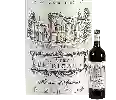
Château Saint NicolasRouge
This wine is a blend of 3 varietals which are the Cabernet franc, the Cabernet-Sauvignon and the Merlot.
In the mouth this red wine is a powerful with a nice balance between acidity and tannins.
This wine generally goes well with poultry, beef or veal.
The Rouge of the Château Saint Nicolas is in the top 10 of wines of Cadillac - Côtes de Bordeaux.
Taste structure of the Rouge from the Château Saint Nicolas
Light | Bold | |
Smooth | Tannic | |
Dry | Sweet | |
Soft | Acidic |
In the mouth the Rouge of Château Saint Nicolas in the region of Bordeaux is a powerful with a nice balance between acidity and tannins.
Wine flavors and olphactive analysis
On the nose the Rouge of Château Saint Nicolas in the region of Bordeaux often reveals types of flavors of oaky, plum or chocolate and sometimes also flavors of non oak, earth or oak.
Food and wine pairings with Rouge
Pairings that work perfectly with Rouge
Original food and wine pairings with Rouge
The Rouge of Château Saint Nicolas matches generally quite well with dishes of beef, veal or game (deer, venison) such as recipes of monkfish tail with white butter, breaded veal cutlets or duck breast with apples.
Details and technical informations about Château Saint Nicolas's Rouge.
Discover the grape variety: Cabernet franc
Cabernet Franc is one of the oldest red grape varieties in Bordeaux. The Libourne region is its terroir where it develops best. The terroirs of Saint-Emilion and Fronsac allow it to mature and develop its best range of aromas. It is also the majority in many blends. The very famous Château Cheval Blanc, for example, uses 60% Cabernet Franc. The wines produced with Cabernet Franc are medium in colour with fine tannins and subtle aromas of small red fruits and spices. When blended with Merlot and Cabernet Sauvignon, it brings complexity and a bouquet of aromas to the wine. It produces fruity wines that can be drunk quite quickly, but whose great vintages can be kept for a long time. It is an earlier grape variety than Cabernet Sauvignon, which means that it is planted as far north as the Loire Valley. In Anjou, it is also used to make sweet rosé wines. Cabernet Franc is now used in some twenty countries in Europe and throughout the world.
Last vintages of this wine
The best vintages of Rouge from Château Saint Nicolas are 2014, 2011, 2008, 2010 and 2012.
Informations about the Château Saint Nicolas
The Château Saint Nicolas is one of of the world's greatest estates. It offers 4 wines for sale in the of Cadillac - Côtes de Bordeaux to come and discover on site or to buy online.
The wine region of Cadillac - Côtes de Bordeaux
The wine region of Cadillac - Côtes de Bordeaux is located in the region of Côtes de Bordeaux of Bordeaux of France. Wineries and vineyards like the Château Prieuré Sainte-Anne or the Château Carignan produce mainly wines red, white and sweet. The most planted grape varieties in the region of Cadillac - Côtes de Bordeaux are Merlot, Cabernet-Sauvignon and Cabernet franc, they are then used in wines in blends or as a single variety. On the nose of Cadillac - Côtes de Bordeaux often reveals types of flavors of black fruits, citrus fruit or dark chocolate and sometimes also flavors of cocoa, chocolate or red currant.
The wine region of Bordeaux
Bordeaux, in southwestern France, is one of the most famous, prestigious and prolific wine regions in the world. The majority of Bordeaux wines (nearly 90% of the production Volume) are the Dry, medium and Full-bodied red Bordeaux blends for which it is famous. The finest (and most expensive) are the wines of the great châteaux of Haut-Médoc and the right bank appellations of Saint-Émilion and Pomerol. The former focuses (at the highest level) on Cabernet Sauvignon, the latter on Merlot.
The word of the wine: Casting
Preparatory phase of the wine-making process consisting in bursting the grapes in order to release the juice.











